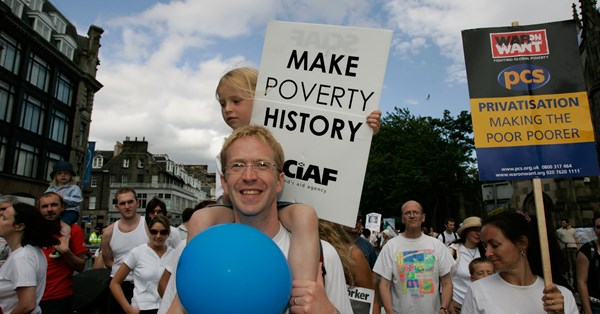IT IS 20 years this year since the Make Poverty History campaign seized our collective imagination. Charities, faith communities, trade unions, and celebrities came together to campaign for trade justice, the dropping of debt, and more international aid. With the UK at the helm of the G8, nearly one quarter of a million protesters demonstrated in Edinburgh, in July 2005, among them entire church congregations, busloads of toddlers and grandmas together. Almost every schoolchild in Britain wore a white wristband in support. For many of my generation, it was on a par with the Iraq War in our political awakening.
Two decades on, international aid is no longer such a popular rallying cause. Activist capacity is pulled in more directions than ever. Climate justice has replaced trade justice as the popular cause du jour, and, domestically, there are needs that feel more immediate. For both the Church and civil society, making poverty history in one parish or postcode is a big enough challenge, let alone having the imagination, ambition, and energy to campaign to end it globally. Public-service cuts, intensified by a dismal global economic picture, have rendered congregational social action less a megaphone and more an emergency service.
All this has shifted the window of possibility to the extent that the last government was able to cut the overseas-development budget from 0.7 per cent of GNP to 0.5 per cent, and this Government has cut it again to 0.3 per cent, to fund more defence spending, without fearing the backlash (News, 7 March). Twenty years ago, the momentum was with those wanting to increase it; today, UK public support for cutting the aid budget runs at more than 60 per cent. What should have been met with the shouts of the quarter of a million who gathered in Edinburgh was met, instead, with little more than a whimper, beyond those in the sector.
And yet the moral responsibility that richer nations bear to act in solidarity with the poor remains. The Labour Government’s manifesto pledged that Britain would be “a good neighbour” and “regain [its] global leadership on development”. The language of being a “good neighbour” resonates with Christian theology, in which “loving your neighbour as yourself” is fundamental. The preferential option to the poor, espoused by Catholic social teaching, goes further, compelling us to prioritise the poor in decision-making. In practice, this cannot look like cutting the amount that we spend on overseas aid, however pressing the competing budget lines are.
None of this is to diminish the importance of defence, nor the need for climate justice. Conflict and poverty are not mutually exclusive. Far from separate issues competing for attention, these are interconnected. We cannot hope for global security while at the same time turning our backs on the world’s most vulnerable.
I long for a society in which a promise to increase the overseas-aid budget is a resounding vote-winner, and the alternative is insupportable. I long for a world in which ending poverty, at home and abroad, feels as achievable as it did 20 years ago, and 0.7 per cent the bare minimum expression of our solidarity with global neighbours. If we are going to get there, we need to start by winning the hearts and minds of the 60 per cent of the country who cannot — yet — see how connected we truly are.
Hannah Rich is director of Christians on the Left.
Paul Vallely is away

















